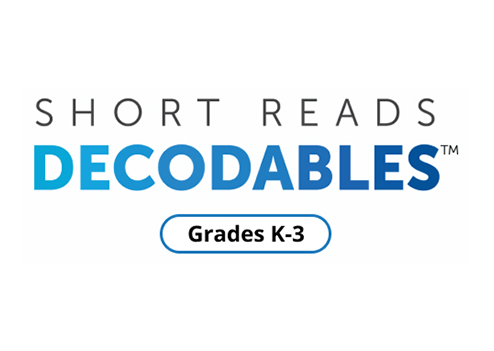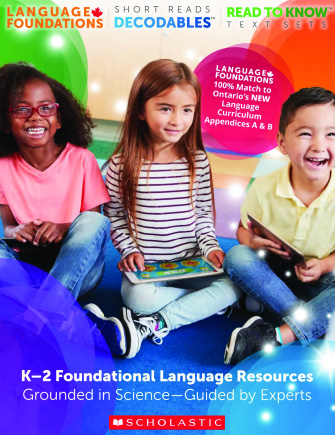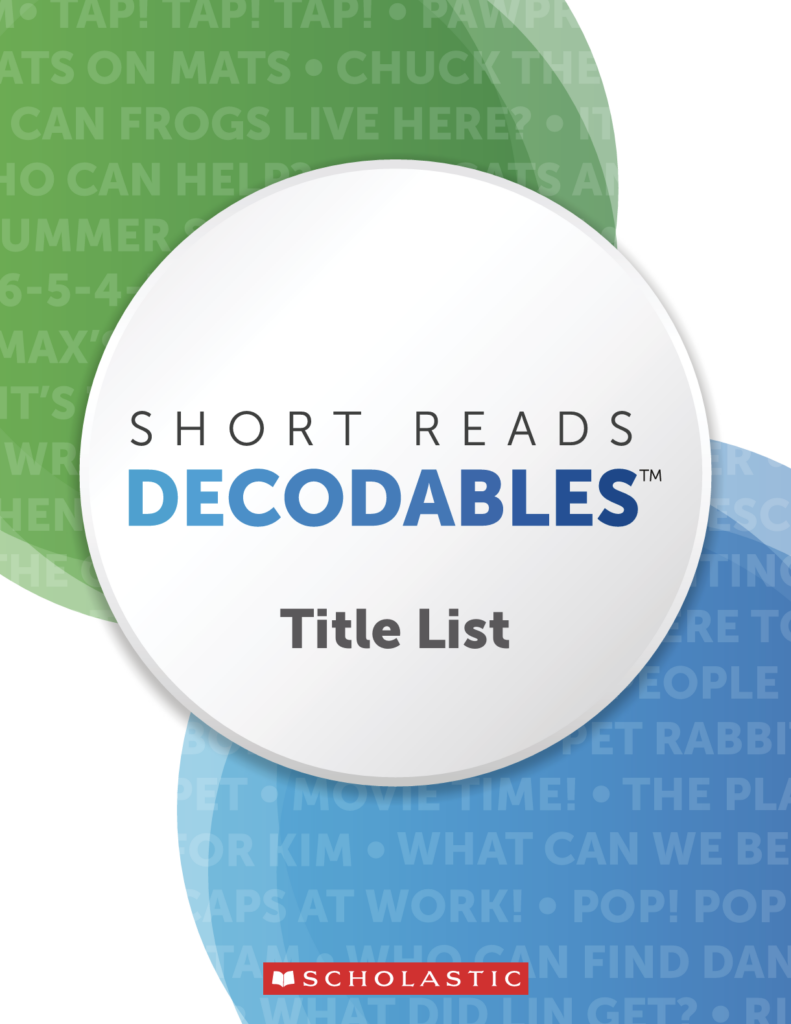90 two-sided text cards that incrementally target individual sound spellings
The research is clear. Systematic, explicit, and cumulative phonics instruction is the most effective way to teach children how to read words. The science of how children learn to read may be complicated but implementing it in the classroom doesn’t have to be.
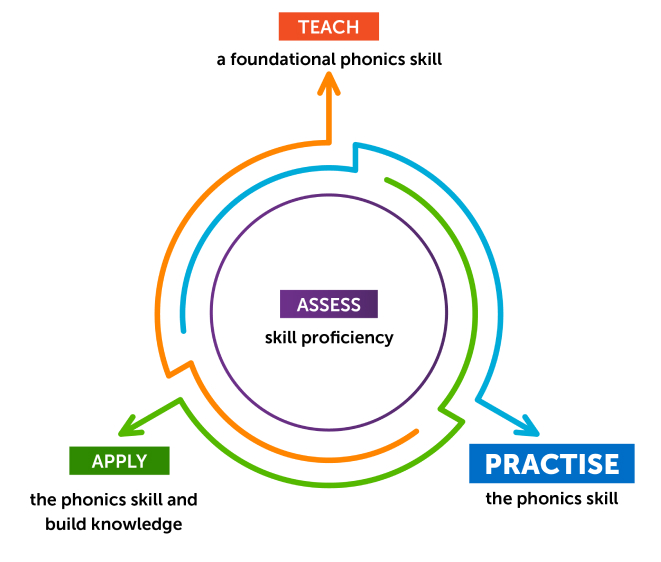
Four Steps, One Framework
Language Foundations, Short Reads Decodables, and Read To Know Text Sets are each built on an easy-to-use framework that breaks systematic instruction down into four simple steps: Teach, Practise, Apply, Assess.
Short Reads Decodables are less intimidating than full print books. Two-sided cards give students a more accessible and manageable format to confidently practise newly taught phonics skills.
Short Reads Decodables in Action

Teach
Each Short Reads Card comes with a lesson that targets foundational skills such as phonemic awareness, phonics, writing from dictation, vocabulary, and writing in response to reading.

Practise
Students read a text card in small groups and receive targeted practise in the phonics skill they’ve been working on in the previous module.

Apply
Students apply new learning through decoding texts, comprehension discussions, and writing prompts.

Assess
Teachers use assessment information gathered throughout Short Reads Decodables to monitor students’ cumulative progress and inform instruction.
Short Reads Decodables Components
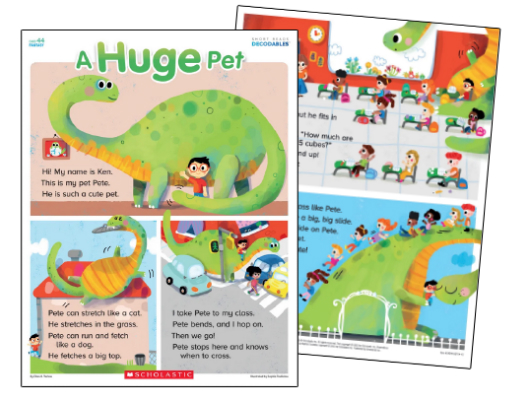
Double-sided Decodable Cards
Short texts empower children to apply their decoding skills while building foundation literacy.
- 90 Student Cards (6 copies of each) designed for whole-class, small-group, and centre-based instruction
- Every 5th Card provides a cumulative review
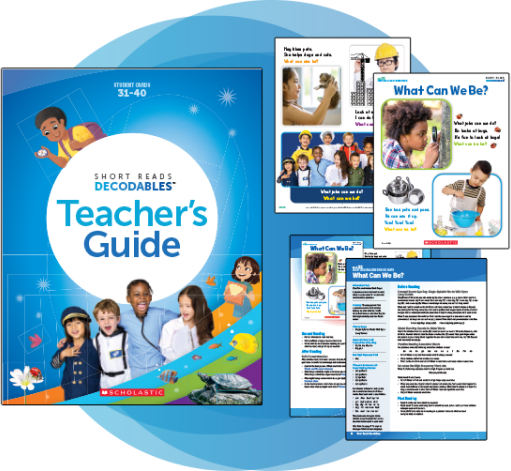
Teacher’s Guides
Explicit and systematic instructional support aligns to the foundational language curriculum. Each Short Reads lesson plan includes:
- Genre and Summary
- Phonics Focus
- Decodable Words with Targeted Sound-Spelling
- New High-Frequency Words
- Phonemic Awareness and Sound-Spellings Review
- Before Reading, First Reading, Second Reading, and After Reading support
- Writing Extensions
Step-by-step lessons
Step-by-step lessons help teachers provide evidence-based, code-focused instruction in these areas:
Alphabet knowledge, phonics, and word study
Grapheme-phoneme correspondence
Sound-spelling
Blending, building, sorting, and spelling
High-frequency words
Reading fluency
Vocabulary development
Language conventions
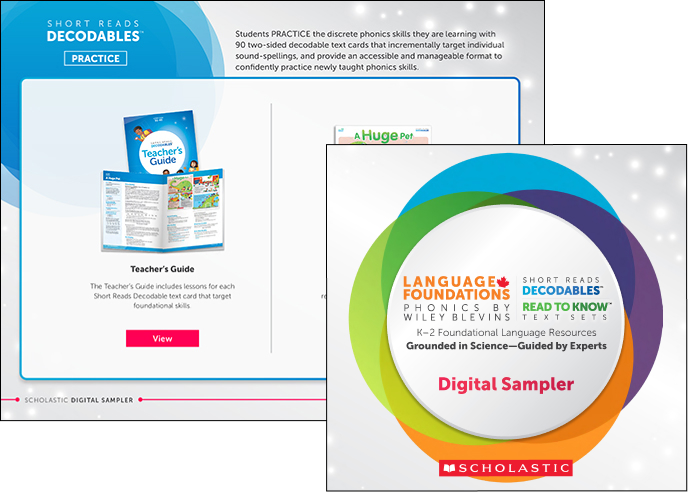
Digital Sampler
View the NEW Digital Sampler to see an example of a double-sided Student Card, a Lesson Plan from the Teacher’s Guide, and assessment opportunities!
Download Sample PDFExperts You Can Trust
To ensure Short Reads Decodables aligns with the latest literacy research, we’ve collaborated with some of the top minds in foundational literacy and phonics instruction.

Wiley Blevins
Author of Teaching Phonics, K–3. He is an author, educational consultant, and researcher who completed his graduate work at the Harvard Graduate School of Education. A former teacher, Blevins is a respected author of numerous phonics professional books, including Phonics From A to Z, and several phonics and reading programs from various publishers. He also wrote the phonics brief from the International Literacy Association, “Meeting the Challenges of Early Literacy Phonics Instruction.”

Dr. Anne Cunningham
Dr. Anne Cunningham is a professor of Learning Sciences and Human Development in the Berkeley School of Education at the University of California, Berkeley. She is a developmental scientist and educator known for her research on literacy and development across the lifespan in which she examines the cognitive and motivational processes underlying reading ability and the interplay of context, development, and literacy instruction.

Dr. Tanji Reed Marshall
Dr. Tanji Reed Marshall is a widely recognized expert on educational equity and educational leadership. She partners with states, school districts, schools, and education organizations to solve complex issues related to educational equity and to ensure that every child receives the excellent equitable education they deserve. Additionally, Dr. Reed Marshall is the Director of P12 Practise at the Education Trust, a non-profi t educational equity and advocacy think tank in Washington, DC.

Linda Gutlohn
Linda Gutlohn is a Science of Reading product consultant who is widely known for her expertise with phonics materials and the development of decodable texts. The editorial director and co-author of the CORE’s Teaching Reading Sourcebook, a highly rated textbook and comprehensive reference for research-based reading instruction, Gutlohn has over 10 years of experience as an elementary teacher and has served as a co-director of a professional development centre and as a language arts consultant.

Jennette MacKenzie, MEd
Jennette MacKenzie is an educator with experience as a classroom teacher, school librarian, district consultant, and principal/principal of curriculum and professional development for elementary and secondary schools. Jennette has taught Principal Qualifi cation Courses and numerous Additional Qualifi cation Courses for Brock University. She has done work for the provincial Ministry of Education and provincial teachers federation. Jennette is the senior author of several leading literacy series used by teachers and students across the country and frequently provides professional development for schools, school districts, and provinces. She is currently conducting research and developing literacy resources for Scholastic Education.
